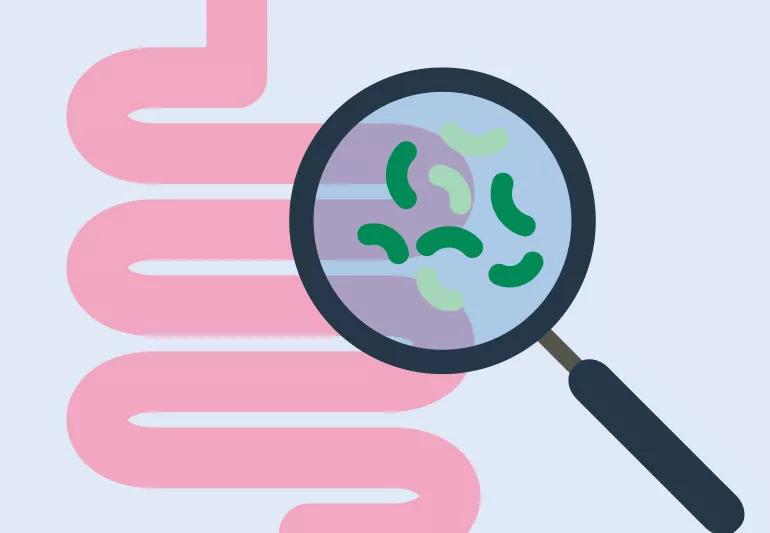Your gut never really stops working — and that’s not even the most incredible thing about it

Your digestive system is working right now as you read these words. It’ll keep doing its job digesting food the rest of the day and all night, too. Tomorrow will bring the same around-the-clock schedule.
Advertisement
Cleveland Clinic is a non-profit academic medical center. Advertising on our site helps support our mission. We do not endorse non-Cleveland Clinic products or services. Policy
You probably don’t give this nonstop activity in your gut much thought, unless there’s an objection down low to that gas station burrito you ate down at lunch.
But the truth is, your digestive system is an amazing network of organs and a fascinating part of human biology. Want proof? Check out these nine facts from gastroenterologist Bret Lashner, MD.
Don’t be fooled by the size label on your small intestine. It’s actually surprisingly long.
If unraveled and spread out, your small intestine would cover 2,800 square feet — an area roughly the size of a regulation tennis court. All of that space is used to help your body efficiently absorb nutrients from what you eat and drink.
The acid in your stomach is strong enough to burn skin. So, how you might ask, can your stomach handle it? A thick layer of mucus protects your stomach lining and keeps the acid on the inside, where it’s churned with food.
This gastric acid can sometimes leak out into your esophagus, which lacks this mucus layer. That leads to the burning feeling of heartburn. (Got heartburn? Try these tips to tame the flame.)
Stress often gets unfairly blamed for stomach ulcers, or the open sores that appear when gastric acid eats away at your protective stomach lining.
Advertisement
The main culprits behind stomach ulcers are:
A century ago, stomach cancer was the most common cancer-related death in the United States. It has tumbled down those rankings over the years and now accounts for 1.8% of cancer deaths.
One reason why? Modern diets include fewer foods linked to stomach cancer, largely due to refrigerators that led to less reliance on smoked and cured meats. Advances in treating H. pylori also helped.
Stomach cancer remains a concern in other areas of the world, though.
Dish detergent breaks down greasy fat on the dirty dishes in your sink. Your body has a similar product — bile acids — to break down the fats you consume for absorption into your bloodstream.
Bile acids are essentially the detergents in bile, the digestive liquid made by your liver. Without these detergents, you couldn’t digest or absorb fats.
Your liver uses cholesterol to make bile acids, and bile is the only way your body can get rid of excess cholesterol. Your body also uses cholesterol to make sex hormones like estrogen and testosterone.
If you have liver disease, you’ll have trouble absorbing fats, as well as hormonal issues.
But fats, which your body burns for energy, are chemically different from cholesterol. That’s why food labels list fat and cholesterol separately.
Let’s start with this fact: Most people with a “gluten intolerance” don’t have celiac disease.
Celiac disease occurs when gluten (a protein in wheat, barley and rye) causes your immune system to damage your small intestine. Symptoms include abdominal pain and bloating, chronic diarrhea and fatigue.
Two types of genetic changes that occur in about 2% of the U.S. population cause true celiac disease. Your doctor can order tests that identify it.
Many people who are gluten-intolerant don’t have this diagnosis but still may feel better on a low-gluten or gluten-free diet. The reason you may feel better (or even lose weight) is that this restrictive diet is low in carbohydrates.
Your digestive tract contains many beneficial bacteria, but taking a probiotic supplement (live or dried bacteria) is unlikely to give them a boost.
Advertisement
The reason? These beneficial bacteria are mostly in your large intestine, or bowel. Probiotic supplements will rarely survive the acid and churning of the stomach or the detergents and enzymes of the small intestine.
If you want to boost the bacteria in your bowel, eat a high-fiber diet, or take fiber supplements (with the approval of your healthcare provider). Fiber is a prebiotic that bacteria can convert to healthy chemicals for nourishment. An added bonus? It can also minimize your risk of colon cancer.
Advertisement
Learn more about our editorial process.
Advertisement

The inability to burp can cause farting, stomach pain and nausea

A healthy gut benefits your entire digestive system — and more

No, it doesn’t stay in your stomach for seven years

An expert explains a complicated relationship

The caffeine and natural acids in coffee may trigger acid reflux, but there are ways to lessen the effects

Wait a few hours, then start with water or ice chips, graduating to clear liquids and then, soft, bland foods

Wearing a scarf, adjusting your outdoor activities and following your asthma treatment plan can help limit breathing problems

Your diet in the weeks, days and hours ahead of your race can power you to the finish line

When someone guilt trips you, they’re using emotionally manipulative behavior to try to get you to act a certain way